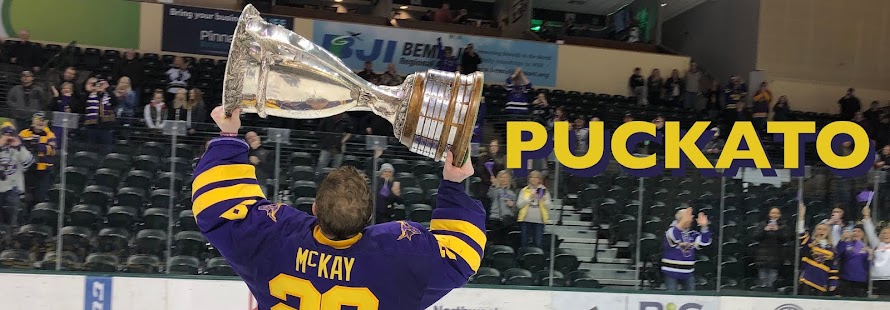Minnesota State and the
WCHA put out the schedule for next season, which is great, because it's never too early to start planning your fall and winter weekends.
Perhaps the biggest news of the schedule is that MSU has opted to start its Saturday-night games at 6:07 p.m.
"We made the decision on the move to an earlier start time on Saturday after a great deal of thought, deliberation, and discussion," athletic director Kevin Buisman said in a press release. "This is a strategy that has been effective in other markets and after consulting players, coaches, fans, event staff and other program supporters we decided to move forward with immediate implementation. I think this change will be particularly appealing to families with younger children and this is a demographic we need to grow as they represent the future fan base of Maverick hockey."
As we've known, the Mavericks will play nonconference home games against Arizona State (Oct. 11-12) and North Dakota (Oct. 18-19), and they'll go to national-champion Minnesota Duluth (Nov. 29-30) and to Minnesota's Mariucci Classic (Dec. 28-29).
They'll play WCHA home series against Bowling Green, Alaska Anchorage, Lake Superior State, Alaska, Bemidji State, Northern Michigan and Alabama Huntsville. And they'll play WCHA road series at Alabama Huntsville, Michigan Tech, Northern Michigan, Ferris State, Bowling Green, Alaska Anchorage and Bemidji State.
Here's a quick look at the schedule:
Oct. 5, Mount Royal (exhibition): As usual, th
e Mavericks will start the year with a preseason game against a Canadian college team. They defeated Mount Royal 7-3 last season.
Oct. 11-12, Arizona State:
The Sun Devils, who are still looking for a conference home, were the surprise team in college hockey last year, making the NCAA tournament. MSU and ASU tied 2-2 at the Desert Hockey Classic with the Sun Devils winning the shootout for third place in the tournament.
Oct. 18-19, North Dakota:
The Fighting Hawks will be in Mankato for the first time since March 8-9, 2013. Last season, MSU and UND played for the first time since then and split their series at Grand Forks.
Oct. 25-26, at Alabama Huntsville:
The Mavericks will open their MacNaughton Cup defense when they go on the road to to face the Chargers.
Nov. 1-2, Bowling Green:
An excellent home schedule to start the season continues with a rematch of the thrilling Sauer Trophy championship game. The Falcons will have a new coach in Ty Eigner after Chris Bergeron's departure to Miami.
Nov. 8-9, at Michigan Tech:
If you're looking to finally make that road trip to Houghton (a bucket-list item for any college hockey fan), an early November weekend might be as good as any.
Nov. 22-23, Alaska Anchorage:
The Mavericks play 10 home games in the first half of their schedule. We should know by this time how much the Seawolves have improved after last year's rough season.
Nov. 29-30, at Minnesota Duluth:
Thanksgiving weekend in Duluth will be special for the Sandelin family as UMD coach Scott will face his son Ryan, who will be an MSU freshman.
Dec. 6-7, Lake Superior State:
The Lakers made a big leap in the league last year and this weekend will return to Mankato where their season ended.
Dec. 13-14, at Northern Michigan:
The Wildcats will look very different than the team the Mavericks battled with the last few years, losing some key players to graduation.
Dec. 28-29, at Mariucci Classic:
This year's tournament will be an all-Minnesota filed with Minnesota, St. Cloud State and Bemidji State. The pairings have not been announced yet, but the hope is MSU will play the Gophers and Huskies.
Jan. 3-4, Alaska:
The Nanooks will be the foe to start the second half of the season in which MSU has eight homes games before playoffs.
Jan. 10-11, at Ferris State:
This will be the only meeting of the regular season between the Mavericks and Bulldogs. Too bad Ferris won't be in Mankato next season.
Jan. 17-18, at Bowling Green:
The Mavericks don't have crazy road stretches this season, but back-to-back weekends at Big Rapids, Mich., and Bowling Green, Ohio, will be tough.
Jan. 24-25, Bemidji State:
That tough road stretch will be followed by the first meeting with the rival Beavers, who don't lose much from a solid 2018-19 season.
Jan. 31-Feb. 1, at Alaska Anchorage:
The Mavericks are making just one trip to Alaska this season, which is never a bad thing.
Feb. 7-8, Northern Michigan:
The Wildcats didn't play at Mankato last year, so this should be one MSU fans will be excited about.
Feb. 21-22, Alabama Huntsville:
Minnesota State's last regular-season home series will be against the Chargers, the team they begin the league schedule against four months earlier.
Feb. 28-March 1, at Bemidji State:
The Mavericks will close out the regular season on the road. Will they be celebrating another MacNaughton Cup this weekend? They'll certainly be the favorite, but the Beavers should be one of the teams that's standing in their way.

